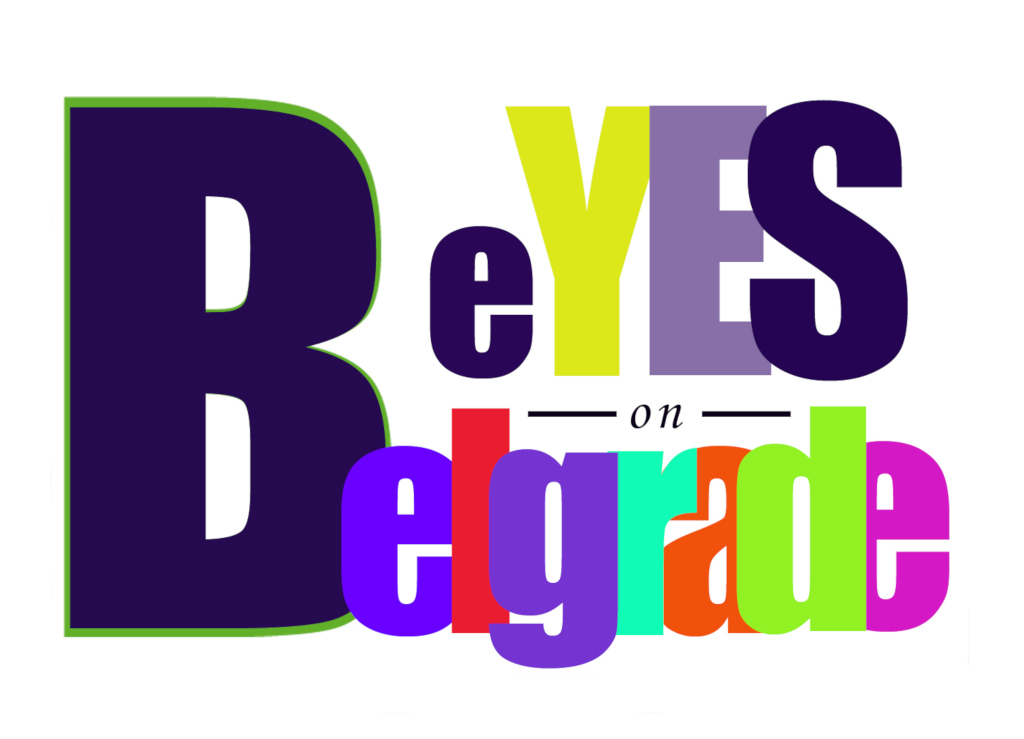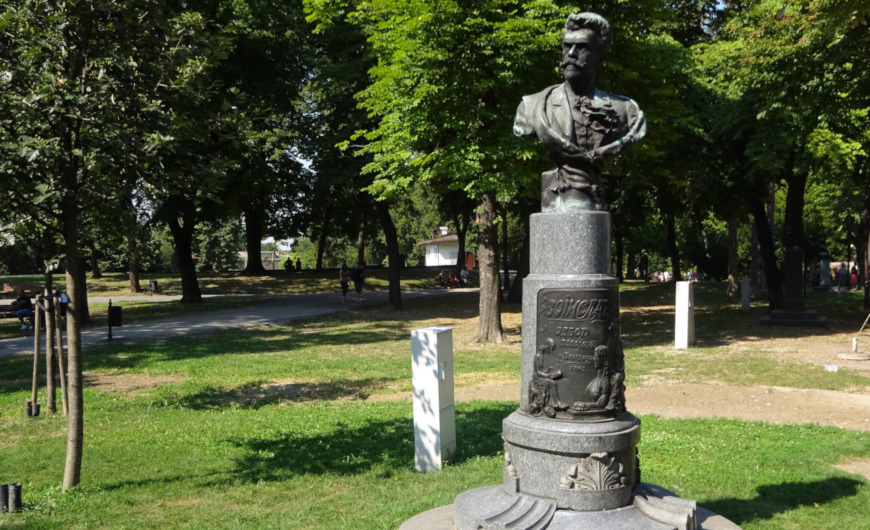On a vast terrain of the Belgrade Fortress there is a pretty big Kalemegdan Park, a place of serenity, nature and walking paths that cuddle the statues of Serbia's finest people. We took a "poetry walk", and said hello to some of the greatest Serbian writers you can meet there.
First we met with Vojislav Ilić, a man who converted the love for his country into most wonderful words and verses. Look at us now, Vojislav - I said to him, - would you still be writing about your beloved country? He didn't even bother to answer me. Of course he would, I thought slapping myself on the forehead. Forgive my imprudence. True love is timeless. You know, I often cite your words to my friends from abroad - I tried to gain his affection, - especially the verses from your song "Homeland" when you say, in my adapted English words, something like "Let elsewhere be fine, even poor I feel you mine". I know, it sounds better in Serbian. Sorry for that. But still, they got the point. You wrote it from your heart, because you lived exactly like you described - I assured him as if he didn't already know that. I turned to the friend of mine, who accompanied me that afternoon. It is fascinating - I said to her, - that he managed to accomplish so much in just 32 years of his life on Earth. He died young, unfortunately. But even so, he is remembered as one of the great ones. The look in his eyes, pay attention, is soldier firm, trying to be serious, but gentle at the same time, like a fun-loving bohemian rascal. Defiant, even. But most of all, loving. I think that she didn't understand at all what I was saying. But you understood me, Vojislav, I am sure of that. However, I must leave you now. Glad we had this little chat - I said waving my hand.
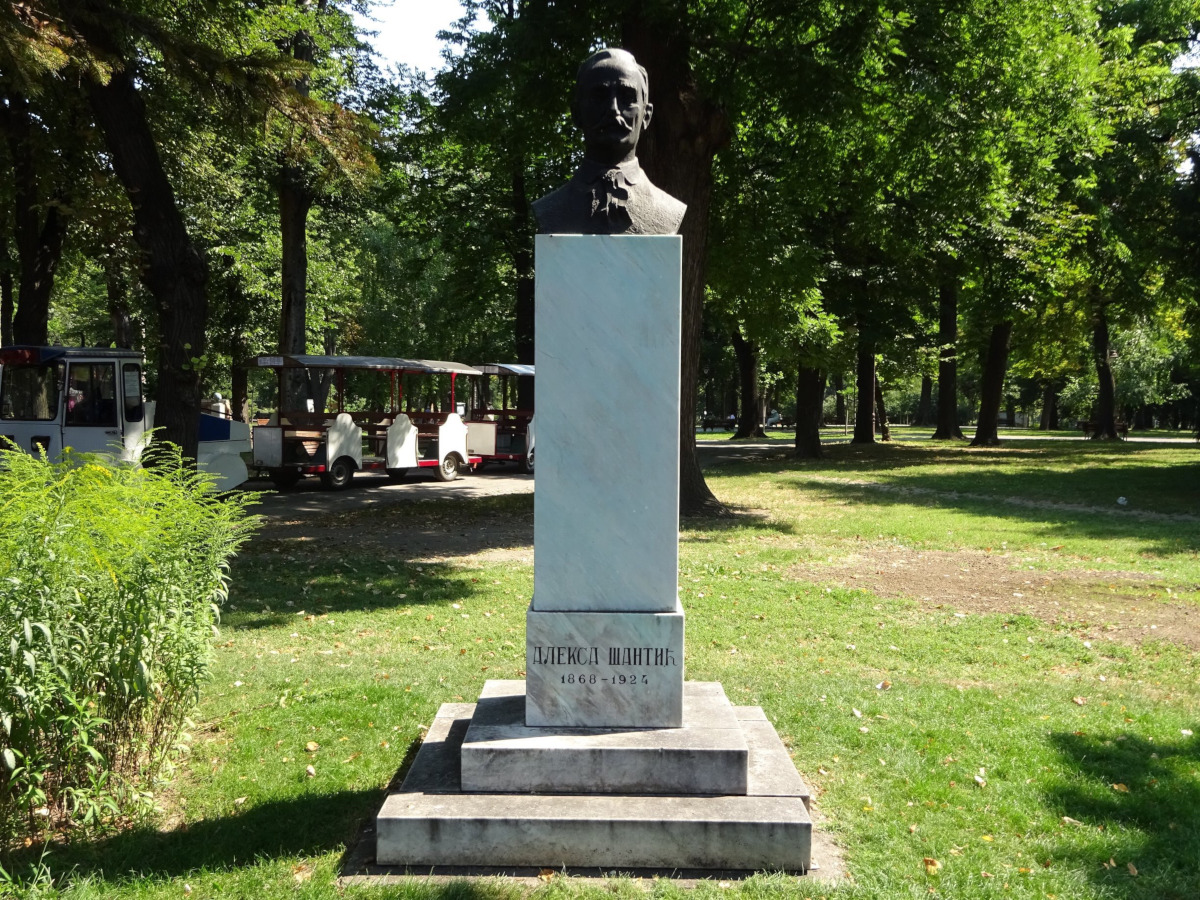
Monument to Aleksa Šantić
Believe me when I say, I am not crazy. And I do not expect these stone cold (or bronze cold) statues to reply to me. I'm keeping it real, don't you worry. As I was saying these words to my friend, in a calm and gentle manner, suddenly I yelled - oh, look, there's Aleksa Šantić! And I waved my hand to him. Or to it?! Not sure of that. However, it cannot be denied, we were standing before one of the greatest masters of Serbian love poetry. And I heard those words from "Longing", saying
"Where are you? I stand by the window, awake.
My forehead touching the glass... Everything sleeps, and I stare..
The night is shiny, the windowsills shake,
As if slowly rustles your blonde hair."
Only a trully gentle soul can write such verses. And you, my dear friend - I said to him, - like your role model, Vojislav Ilić, had also a strong patriotic charge in your poetic expression. He smirked, pleased. I noticed it. And I moved on, satisfied.
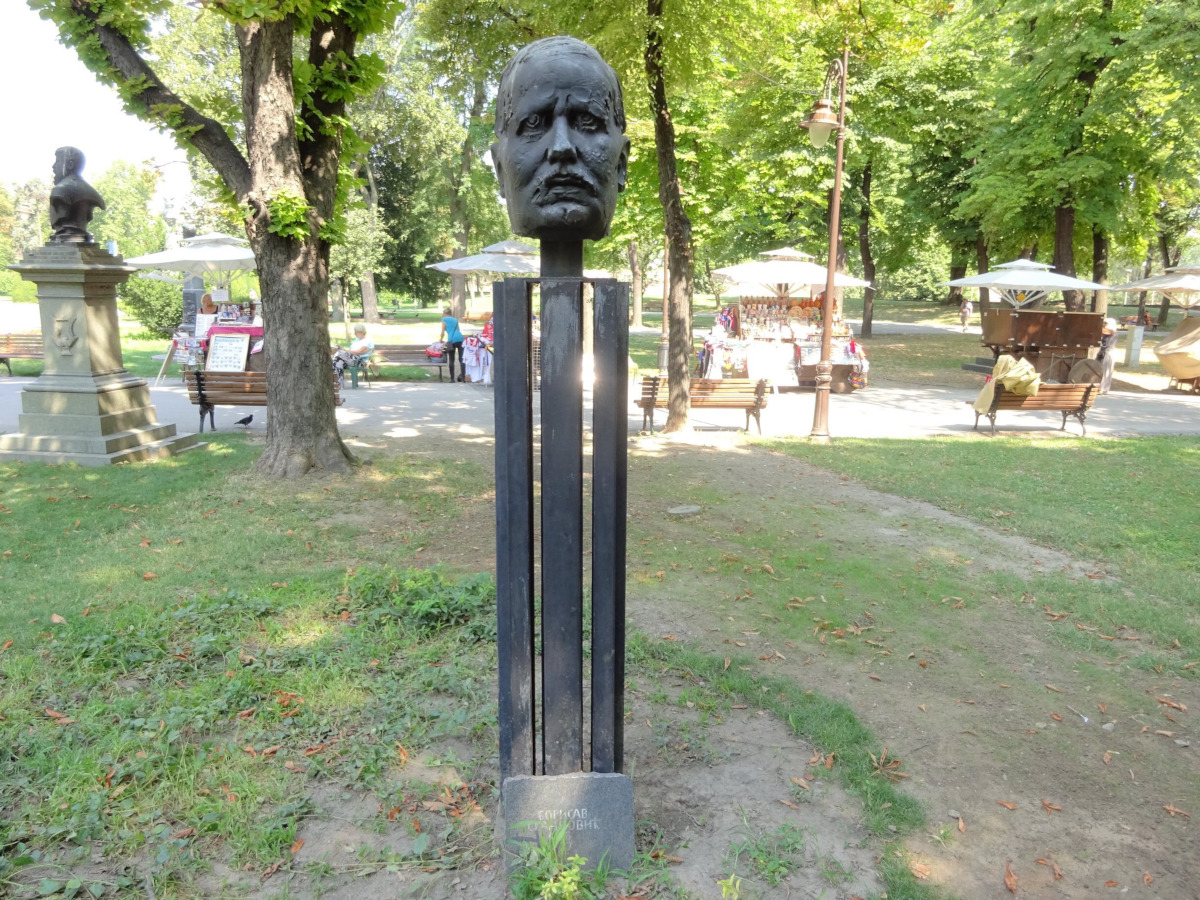
Monument to Borislav Stanković
Who do we have next? - I asked myself. Oh. Well, of course. There it was, this inexplicable monument of Borislav Stanković, Serbian novelist and playwriter. Inexplicable himself, he was, I thought. So, in a way, it suits him fine. But, on the other hand, look at it, please. What is this? It looks half-done. Like his work, maybe. He was very much disputed, you know, and I think he still is. This is due to the fact that he did not pay too much attention to the grammar or the ortography, and he wrote his opus in colloquial speech of Southern Serbia, which is pretty incomprehensible to everybody else. He argued that his only job was to tell the story, realistically. And, he did it, alright. His stories are passionate and put you in an atmosphere where you can almost feel and touch his protagonists. And the words, with all grammatical imperfections, are just adding to the overall feeling. You put commas, and full stops wherever you want, I don't care - he said. This lack of literary standards in his work is something that can be regarded ambiguously. Even so, he is considered to be among the great ones, and his novels and dramas are a must read for the kids in elementary schools in Serbia. He was giving me a look. He didn't like me being there. He must have felt that neither could I determine my thoughts on his literary work. No disrespect, though.
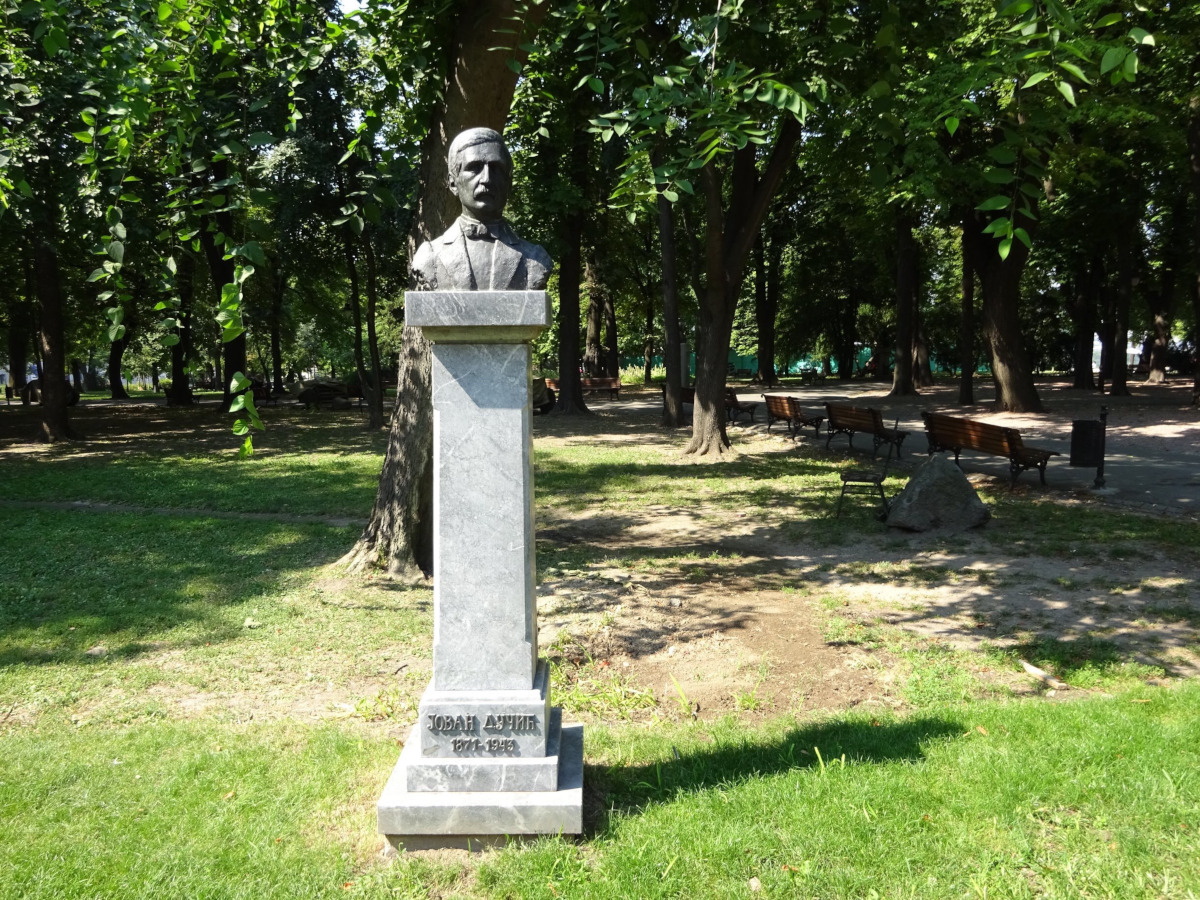
Monument to Jovan Dučić
So, I moved forward. Who else is there? - my friend asked. We have Jovan Dučić - I replied. Good old Jovan Dučić. He was both a poet and a diplomat. Picturesque in his expression, with strong patriotic feelings, Dučić followed the legacy of Vojislav Ilić and Aleksa Šantić. But he did go even beyond that, and stepped out boldly to embrace new, modern lyrical tendencies, which made him one of the most recognized representatives of Serbian modernism. His verses became loose, vivid. Hear, my friend, from "Song of the heart":
"To disappear in the heart of a lover,
To die in immortal! Your spear,
To throw it before the feet of some mighty power,
Which makes even hero's arm fear".
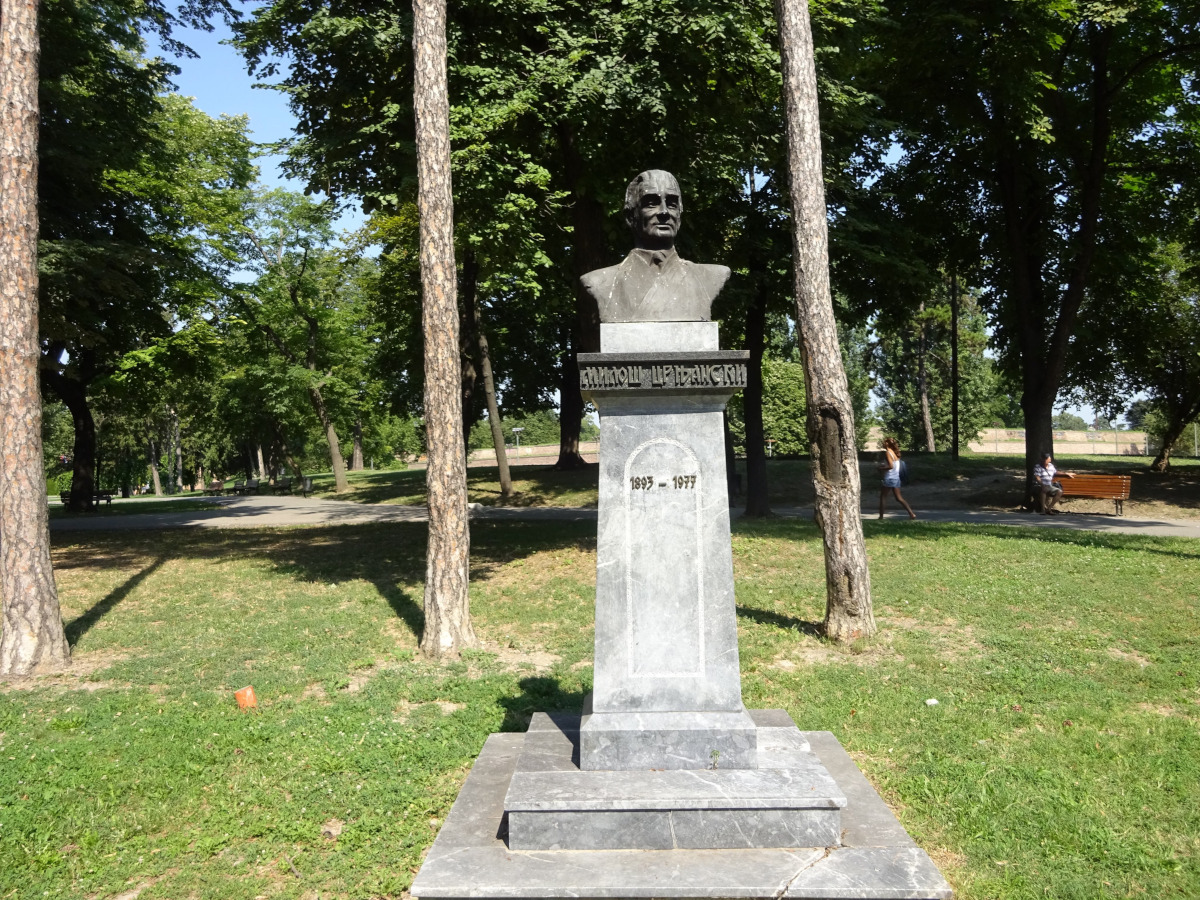
Monument to Miloš Crnjanski
Pretty intense, eh? Indeed. Before we said goodbye, we had one more tribute to pay. Maybe the biggest one. To my heart, maybe the dearest one. To Serbian people, certainly the most important one. Who is the greatest Serbian novelist of all times? Actually, this is not such a difficult question as it may appear. Ivo Andrić, our Nobel prize winner for litterature, is most probably number one candidate. Right beside him, and right before us in that moment, Miloš Crnjanski was standing. His novel "Seobe" (eng. "Migrations") reflects on the suffering of the Serbian national being, of the people who had to flee their homeland, who were born abroad, and who often had to battle for their survival and wage wars of others. Like himself. This is probably one of the most important Serbian novels, if not the most important one. But Miloš Crnjanski was so much more than that. A true cosmopolitan that ached for his homeland. He wrote novels and stories on London, Rome, Tuscany, Berlin, Germany, Lisbon.. he was far north in his litterature fiction, visiting Hyperboreans, he wrote about Michelangelo, about Albrecht Dürer, yet all the time lamenting over Belgrade. Yes, over our dear and beloved Belgrade. Read it, please, my friend, as this is the most wonderful display of love for a city man could have ever written. With it, we ended our walk and let ourselves be taken over by some damn good poetry.
LAMENT OVER BEOGRAD
Miloš Crnjanski
YAN MAY EN and my Srem
Paris, my dead friends, cherries in China,
visit me here as apparitions, while I am silent, sleepless, and dying
and lie cold, like a log on its ashes.
Only, we are no longer we, life, or stars, either,
but some monsters, polyps, and dolphins,
tumbling over us, floating and riding,
howling: “Dust, ashes, and death this is”
shouting Russian “nyitchevo”
and Spanish “nada”.
Meanwhile, with a bright morn star, you grow,
with the Avala, blue, in the distance, like a hill.
You sparkle, even as the stars are fading here,
like the Sun melting the tears’ ice and last-winter’s snow.
There is no nonsense in you, no death.
You shine like an old unearthed sword,
in you all is reborn, and keeps dancing, swirling,
repeating like the day and child’s tear.
And when my voice, my eyes, and my breath are gone
I know, in your lap, you’ll hold me near.
ESPAÑA and our Hvar
Dobrovic dead, in the Sahara a sheik glowing white,
still visit me as ghosts, phantoms and flames.
My Sibe gone mad, agape like a fish, dead.
Only, this is not us, in youth or strength,
but some parrots, chimpanzees, sad,
laughing at me, in my solitude, screaming
One “Leiche! Leiche! Leiche!”
another“cadavere”drones,
the third “Corpse, corpse, corpse”.
Meanwhile, you spread oblivion, like a swan its wings,
over the rivers Sava and Danube, in dream.
You awaken glee, that once was mine,
a giggle, here, in my cry, wail, and scream.
There is no worm in you, not even from a grave
You glimmer, as through tears, a human laugh.
In you a plowman sings, even in winter, brave,
pouring the blood, into a new vat, like wine,
And when my head drops and my hour stops,
you, and no other, will kiss me like a mother.
YOU, THE PAST and my world,
youth, loves, gondolas and Venice in the skies,
still vivid in my mind, a reverie, wave, a glorious bloom
in the company of masks that come for me.
But it is not I, or Venice, blue,
but ruins, ghosts, and tombstones
remaining behind on the ground, or in grass.
They say: “Here lies a pasha! A beggar! A dog!”
and shout in French “Tout passe”,
And our “gone”.
You, meanwhile stand above the spacious river,
over the lush plains, like a shield, raised and hard.
Blissfully resonating with a distant thunder,
weaving through ages, with lightning, your own line.
There is no, in you, my human sadness.
Like an archer’s, your look is quiet and straight.
Like rain, you turn tears to colorful rainbows
and, once inhaled, cool me like a distant pine.
My heart will grow still, and in that hour
your acacias will sprinkle on me like a shower.
LISBOA, and my voyage
into the world, castles in the air, and the ocean-foam
still appear, while my candlewick quivers like a twig,
and I move my land and all into the dream, dream.
Only, these are no women, no live men,
just shadows, helpless, weak and sad,
telling me they are not beasts, and not at fault
for the life giving them an absolute naught
They murmur now “nao, nao, ”
and our”no, no, no”.
Meanwhile, in the calm of the night, you breathe
to the stars’ height, bringing the Sun to your dream,
You hark to the hum of your heart, hitting the depths
like a rock against the Kalemegdan, dark.
To you, our pain is insignificant like ants.
The pearls of our tears you throw to the dust.
But above them your blue dawn arises,
which, as young and happy, I embraced.
And when my tired heart stops to beep
a soft headrest you will be in my sleep.
FINISTERE and her body
marriage, kisses, and storm once so strong
visit me still, a few butterflies, poppies, and wheat
while from the past I hark to her step so neat.
Only this is not she anymore, nor her smiling voice
but a cormorant, his wings black and wild
shouting: A spark of any joy sinks into the Ocean.
and murmurs to me tombe and sombre,
and screeches their ombre, ombre
and our tomb and dark.
Meanwhile you launch as our swan eternal
from death and blood, toward the Sun, on your way.
While my day sinks to your river bottom
you rise from the morning gleam like a sun-ray.
I will stop alone somewhere in the Sahara desert
where caravans are but a mirage in the sand,
as Tuareg mother squats by her dead son
you will be my solace till the end.
And when they break my soul, spear, leg and arm
they cannot break you, or cause harm.
LIFE of a human, and a hound,
a dry leaf, seagull, doe and the Moon above the sea
appear to me, in the end, at this stage, like a dream, or death,
of one by one actor from our stage.
Only, all of it, including me, has never been more
than some foam, moments, whisper in China,
like the heart, growing colder and softer, murmuring
that nothing lasts, neither Ming, nor Yang or Yin
neither Tao, cherries or mandarin!
No one and nothing!
Meanwhile, even now, through my slumber, you shine,
through tons of our tears, enduring, into the dark and dust
your blood, like dew, is spread atop the plains and vales
like before, to cool off the multitude’s last exhales.
Once more, I embrace, your steep stone face
you, the Sava and your Danube, slow.
The Sun is born in my dream. Shine! Fire up! Thunder!
Your name like from the clear sky-- sudden wrath!
And when the old clock beats my final hour
your name too will be my last breath.
(Translated from Serbian by Dr. Mirjana N. Mataric, 2010)
 English (United Kingdom)
English (United Kingdom)  Srpski latinica (Srbija)
Srpski latinica (Srbija) 